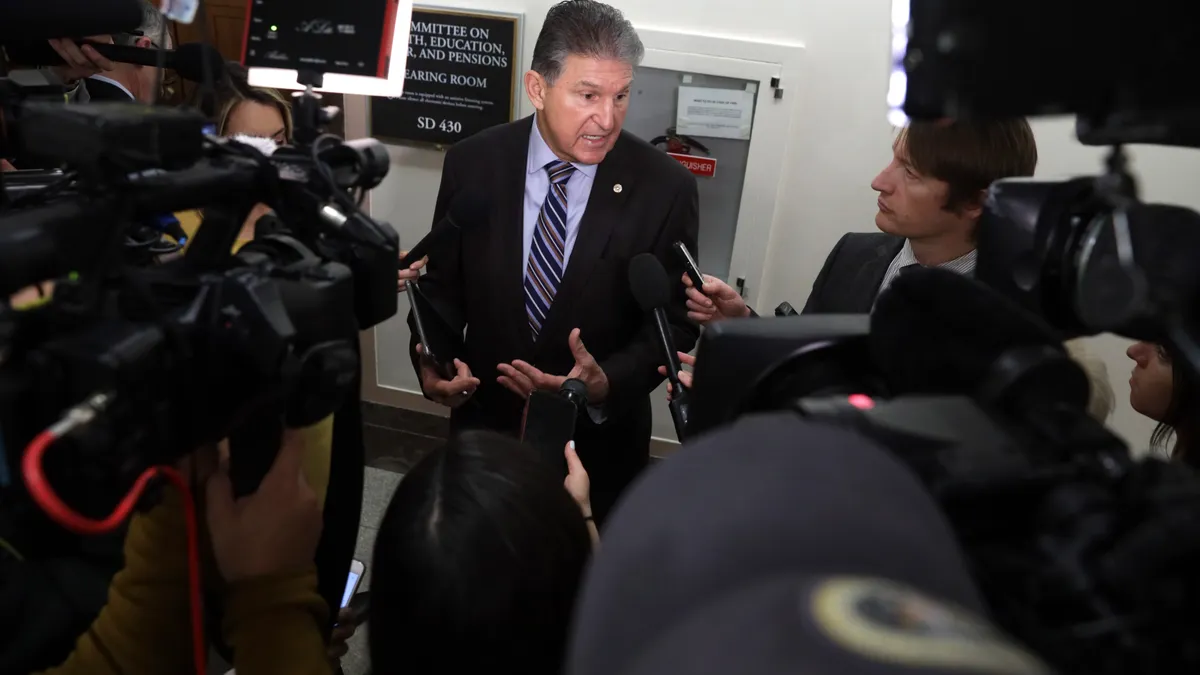Dive Brief:
- Sen. Joe Manchin, D-W.Va., offered a spirited defense of the nation's coal-fired power plants Thursday at Edison Electric Institute's 2021 conference.
- Manchin, whose home state is a major coal producer, also gave a nod to the struggling nuclear sector, arguing for the importance of these power plants in fighting climate change.
- Manchin also expressed skepticism over President Joe Biden's ambitious goal to bring the power sector to 100% carbon-free electricity by 2035.
Dive Insight:
Manchin, who chairs the Senate Committee on Energy and Natural Resources, outlined his stance on coal-fired power plants, nuclear power and other major energy issues on the last day of EEI's 2021 conference — The Road to Net Zero.
Manchin argued U.S. coal-fired power plants are being unfairly singled out by environmentalists, when they are only a small part of the global coal sector.
The U.S has far fewer coal plants compared to the 6,600 operating worldwide, Manchin noted in an interview with Nick Akins, CEO of American Electric Power (AEP) adding most of those U.S. plants have had their carbon emissions reduced, or "scrubbed."
"This is a global climate," Manchin said. "Some of our environmental friends … they make it believe we are polluting the whole climate."
Manchin's comments come as West Virginia, one of the nation's top producers of coal, faces a steady decline in what has long been one of its major industries as natural gas and renewable energy sources grab an ever-larger share of the power plant market.
Total coal production has dropped by more than half in the past decade, with West Virginia losing more than 50,000 jobs in the mining industry over the same period, according the Mine Safety and Health Administration.
Manchin also argued for more research and investment in carbon capture and sequestration, contending the focus should not be on eliminating forms of energy, but making them cleaner.
"You cannot eliminate your way there, (but) you can innovate your way there," Manchin said.
Manchin also expressed skepticism over the ambitious carbon reduction goals the federal government has laid out.
President Joe Biden's administration has set a goal for a 50-52% reduction in U.S. economy-wide greenhouse gas emissions by 2030 (below 2005 levels), while setting a 2035 goal for the nation's electric utilities to convert to 100% clean power.
"I am concerned the timetable they are setting is a very aggressive timetable," Manchin said.
Nuclear plants will have to play a key role in reaching those targets, Manchin said, adding he was surprised when he saw projections from the Biden administration that included the closing of some plants.
"We have to make some policy changes that will allow [those plants] to stay open," Manchin said.
For his part, Manchin has become a pivotal player in the evenly-divided Senate, with his vote potentially making or breaking a range of proposals including the Biden administration's $1.7 trillion infrastructure plan, which includes sizable spending on renewable energy.
Akins, the AEP CEO whose power company is based in Columbus, Ohio and provides electricity to West Virginia, among other places, alluded to Manchin's new influence in the current political environment.
"If you don't know who Joe Manchin is, you probably should," Akins said. "There is no more important person, not just for our country, but for our industry."
Asked about his stance on the Biden administration's $1.7 trillion infrastructure proposal, Manchin said he sees hard infrastructure, for things like roads, bridges, sewers and the electric grid system being split off from other spending he called "human infrastructure."
Manchin said he sees hardening the electric grid to prevent disruptions from natural disasters or cyber attacks as something that should be addressed, calling for tax incentives for utility companies to undertake such projects.
"I think we are going to have a separation of traditional infrastructure versus human infrastructure," he said.














